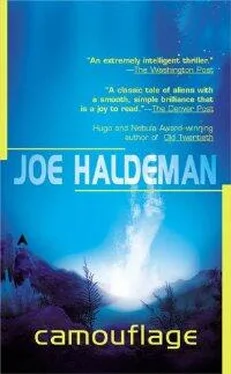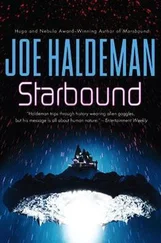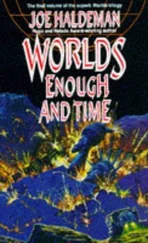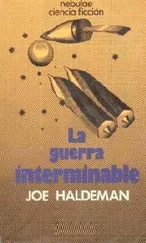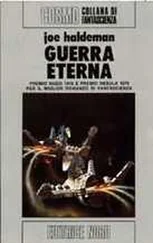Russ sometimes reacted to stress by eating. He got to number 7 a half hour before their noon meeting, and while brewing tea orchestrated a huge sandwich. Ham and beef and salami slices alternating with goat and cheddar cheese, sliced pickle, and tomato and lettuce. They were out of pickled beet slices; he put them on the list. One slice of bread was slathered with mustard and mayonnaise, the other with peanut butter. He compressed the thing down to manageable proportions and sliced it in two diagonally.
“You’re not going to eat all that by yourself, are you?” Jan was watching from the door.
“I’m willing to share.” He put half of it on another plate and carried both to the table.
“Want tea?” She poured two mugs and brought them over.
She inspected the sandwich carefully and removed the pickle. “We’ve modified the thing so the first shot will be a tenth of the normal minimum power.” She sliced a corner off the sandwich and nibbled on it. “Peanut butter?”
“So that would be about a thousand megajoules?”
“More like one and a half times that. We tried it out on a big block of stone down at the quarry.”
“I’m surprised I didn’t hear the explosion,” he said around bites. “Peanut butter’s the healthiest part of the sandwich.”
“The engineers took precautions. It was swaddled in a ton of some kind of protective cloth. I mean, it is a spalling laser.”
“So it spalled impressively?”
She nodded. “Blew it to flinders. Then blew out a piece of the quarry wall behind it, two hundred meters away.”
“How long did it go?”
“Half a microsecond burst, they said.”
He shook his head. “It’s too big a leap. That must be a thousand times the energy flux we’ve brought to bear on the thing.”
“About eight hundred, I think. But that laser didn’t even warm it up.” That was true; they’d tried a twenty-million-joule industrial laser on it, and the thermal sensors hadn’t budged. The thing seemed to be an infinite heat sink.
“What if we destroy it?”
“I think we’ll be lucky to get enough ablation for an absorption spectrum.”
“And if you don’t, you crank it up to full power?”
“Only by degrees. We’ll be cautious, Russ.”
“Oh, I know you will.” He took a big bite and concentrated on chewing it. “I’m mainly … I’m just worried about the first shot. If that doesn’t affect it, it can handle another factor of ten.”
“You anthropomorphize it. Brave little spaceship versus the monstrous military-industrial complex.”
“You’ve been hanging around too much with Jack. Speaking of anthropomorphizing. He’s angry with the thing.”
“Well, it’s resisting his advances.” She looked at him steadily. “He doesn’t like that.”
Russ couldn’t repress a smile. “He doesn’t, eh?” Jack’s attraction to the astrobiologist had been immediately obvious.
She rolled her eyes. “I’m a grandmother.”
“But not very grandmotherly.”
“Don’t you start. I’m ten years older than you.”
Eight or nine, Russ thought, but didn’t press it. “You want something besides the sandwich?”
“Pepcid. I brought my own.”
Bataan, Philippines, 28 march 1942
Thousands of American and Filipino captives were herded onto dusty fields outside of the town of Mariveles, and made to sit under the baking sun without provision of food, water, or latrines.
The changeling and Hugh had each managed two canteens, and they had a loaf of hard bread between them. The other fifty- some Marines were someplace else in the vast sea of suffering men. Some units had stayed together, which proved a significant advantage for individuals’ survival; others, like the Marine detachment, were broken up.
Hugh carved an inch-thick slice of the bread with his mess-kit spoon, and they split it. The changeling could have done without, of course, but couldn’t think of a reason to refuse. He took the smaller half.
“God, I’d kill for a burger,” Hugh said quietly, eating the bread in pinches of crumbly dry crust.
“People will kill for bread soon enough,” the changeling said, “unless they decide to feed us.”
“Kill for water,” Hugh said, taking a small sip.
People did die from water, starting that day. Dehydrated, they would greedily lap or suck from any source, and every source that wasn’t purified was contaminated. Dysentery increased the foulness of the camp, and further dehydrated the dying men. The Japanese opened a tap that gave a trickle of brown water to people who were strong enough to stand in line for hours. Hugh had a tin of iodine tablets that made the water safe to drink, though the taste made most people gag.
The changeling thought the iodine was a delicious condiment. Like the chlorine it had enjoyed in boot camp, iodine was a halogen, toxic to most Earth creatures.
When night fell, the Japanese soldiers moved through the horde of collapsed captives, yelling and kicking at them. The ones who were dead, or not alive enough to respond, were buried by the ones who were able to hack a hole in the hard ground with entrenching tools.
Some were buried prematurely. If they struggled, a guard would help them along with rifle butt or bayonet.
At dawn, they started pulling people at random to form into marching ranks of forty to a hundred each. When he saw what they were doing, Hugh gave the changeling half the iodine tablets, folded into an old letter from home. That was a prescient as well as an altruistic act; minutes later they hauled him roughly away. They would not see each other again for a long time.
The changeling sat quietly for two more days, watching the crowd of strangers around it thin. From the lack of bread, it shrank imperceptibly, and tried to mimic the symptoms of starvation, to keep from standing out.
On the third morning, two soldiers hauled the changeling to its feet and pushed it to the road. It joined a motley crowd of Army and Navy men, some asleep on their feet, a couple being held up by others.
A Japanese yelled something like “March!” They straggled forward. Someone started to call cadence, but several others advised him to shut the fuck up.
At first they stayed in a fairly coherent group, but as the sun grew higher, the worst off began to fall back. The road was rough, torn up by tank treads and occasional torrential rains, and even a person who was totally in control of his faculties would have found it difficult to maintain a forced-march speed.
The only person in total control of its faculties was not even a person.
The Japanese hounded the stragglers, whipping them with ropes and punching them with gun butts, and prodding with bayonets the ones who still lagged behind. At first it was shallow jabs to the buttocks and back. After awhile they jabbed harder, and the ones who fell and couldn’t proceed were shot where they lay.
All the time the soldiers kept up an indignant tirade against their captives. The changeling wondered whether they were actually so unworldly and ignorant as to suppose that everyone spoke their language. It began to work out a basic vocabulary, at least of imperative commands. It could see that there might come a time, soon, when it would be practical to change form for awhile; become Japanese.
For several days there was little variety, except when the blistering heat was punctuated by torrential downpour. That would leave rapidly shrinking mud puddles from which people could try to fill canteens, or just fall to the ground and lap, if the guards allowed it.
The changeling had altered its metabolism to do without food and water. It imitated the bone-weary stagger of the men around it, but still had its normal strength, which led to its murder.
Читать дальше
